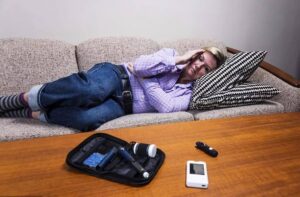Low blood sugar | causes and treatment

Low blood sugar is a common condition in diabetic patients but could happen in non-diabetic people.
قائمة المحتوى
What is low blood sugar?
Low blood sugar is a pathological condition that occurs when the blood sugar level (glucose) is below average (less than 70 milligrams/deciliter).
Glucose is the primary energy source in the human body; hypoglycemia often occurs in people with diabetes due to diabetes medications but rarely occurs in people who do not have diabetes due to other drugs or exceptional cases.

Symptoms of low sugar
When your blood sugar level drops below 70 milligrams/deciliter, you’ll have some symptoms that occur quickly and vary from person to person, as follows:
- Irregular or quick heartbeats.
- Fatigue and tiredness.
- Pale skin.
- Quivering (shaking).
- Nausea.
- Anxiety and disorder.
- Excessive sweating.
- Sudden and severe hunger.
- Numbness or tingling in the lips, tongue, or cheeks.
As the condition worsens, some additional symptoms are more likely to occur as follows:
- Mood disturbance.
- Aggressiveness and anger.
- Lack of balance and asymmetry of movement.
- Confusion and abnormal behaviour.
- Difficulty speaking.
- Inability to focus.
- Blurred vision and blurring.
- Seizures (convulsions).
Symptoms of low blood sugar during sleep:
- Yelling.
- Nightmares.
- Sweating too much until your clothes get wet.
- Feeling tired, unsettling and irritable when waking up.
If you have diabetes and feel one of these symptoms, take sugar treatment immediately (fruit juice, soda water, candy, glucose tablets); if you don’t respond to the therapy, hurry up by going to your doctor. If you don’t have diabetes and feel these symptoms, you need to go to a doctor immediately.

Causes of low sugar:
Sugar reduction occurs when blood glucose reaches 70 milligrams/dL (3.9 millimol/L).
Causes of low diabetes in diabetes:
- Taking a large amount of insulin or some types of oral diabetic treatment.
- Eating a small amount of food after taking the diabetes medication.
- Doing more sports and physical effort than usual.
- Drinking alcohol in large quantities without eating.
Reasons for low blood sugar in a healthy person:
- Accidentally taking diabetes medication.
- Taking some of the drugs that lower the blood sugar, especially in children and kidney failure patients.
- Liver disease, kidney failure and thyroid failure.
- Presence of pancreatic tumour that secretes insulin in a large amount.
- Hormone dysfunction, especially cortisol deficiency and growth hormone deficiency, as some hormones play an essential role in glucose manufacturing.
- Drinking alcohol because makes the liver unable to take glucose out into the blood.
Causes of low diabetes in pregnant women:
- Hypertension.
- Excess weight before pregnancy.
- Pregnancy diabetes (Gestational diabetes).
- Increased weight in the first pregnancy.
- Not taking meals in time.
- Not eating healthy foods.
- Not eating enough carbs.
- Exercise too much.
- The embryo consumed a lot of his mother glucose.
Cause of low sugar in children:
- Not eating for long hours.
Usually, low blood sugar is caused by eating a small amount of food or not eating a meal, but it can also occur when eating a meal with a high sugary rate because your body will produce insulin more than what you need.
What’s the treatment for low sugar?
Low blood glucose requires rapid treatment, and in most people, the index of low blood sugar starts when the level of glucose reaches 70 milligrams/dL (3.9 millimol/L) or less (your rate can vary; ask your doctor).
The treatment aims to bring the blood glucose back to normal, whether with high – sugar food and drinks or with medications. The treatment of persistent and recurrent low sugar should be sought and treated by your doctor.
Immediate treatment for low sugar:
If you feel the symptoms of low blood sugar, and you can help yourself, then immediately do, which is called the 15-15 rule:
- Eat or drink 15 grams of fast-acting carbohydrates, such as food containing sugar without protein or fat to be easily digested into glucose: biscuits, sugary juice, gaseous water, sweets, candy, honey, and you can use glucose tablets or glucose gel.
- Measure your sugar level after 15 minutes. If your blood sugar level is still less than 70 milligrams/dL, take another 15 grams of fast-acting carbohydrates, then measure the sugar again after 15 minutes.
- Repeat this process until your blood sugar level rises above 70 MB/DL.
- After your blood sugar has stabilised, you can have a snack to keep your blood sugar level.
- Ensure that the 15-15 rule is used to avoid taking a large amount of sugar, which results in a significantly higher level of sugar.
- To take the equivalent of 15 grams of carbs, e.g. half a cup of juice or gaseous water, a small spoon of sugar or honey, a piece of candy.
- Children usually need less than 15 grams of carbohydrate to treat low sugar, ranging from 6 to 10 grams (ask your doctor about the right amount).
- Foods containing proteins and fats besides carbohydrates (such as chocolate) are not used, as the body takes too long to turn them into sugar.

Immediate treatment for acute low blood sugar:
When the sugar level drops sharply, you’ll faint, so you won’t be able to help yourself. But it would be best if you took a hypoglycemia bag wherever you are, and friends and family have to learn how to use it. It’s the only solution during the blackout because you can’t eat any sugary food or drink.
If no one can use a glucagon bag, you will need to be taken to the hospital immediately, and the doctor will use it or treat you by injecting glucose Intravenously.
Diabetic patients are preferred to wear an ID that tells about their condition so in cases of blackout or inability to speak. The ID is usually in the form of a bracelet or necklace that contains some vital information about the patient’s state of health.
Treatment for persistent and recurrent low blood sugar:
When treating recurrent low blood sugar, the doctor searches for the factors causing this, and accordingly:
- If the cause of low blood sugar is diabetes medications, the doctor will likely recommend changing the dose or changing the medication.
- If the cause is a pancreatic tumour (insulinoma), the doctor will treat it by surgical removal of part of the pancreas (which in some cases is necessary).
Risks of low blood sugar:
If low blood sugar is not treated, the patient condition can progress to convulsions, loss of consciousness, and death.
Low sugar may also contribute to:
- Dizziness and weakness.
- Fall and injuries from fainting.
- Road accidents if you get the condition in the road.
- Mental disfunction on ageing
-
Silent hypoglycemia:
When the reduction in sugar is not controlled, and the patient is exposed to this condition frequently, it may lead to the so-called silent hypoglycemia (lack of awareness of hypoglycemia).
This is due to the frequent reduction of the patient’s sugar for a long time. The body and brain become accustomed to this condition and do not show any symptoms or indications to alert the patient to low blood sugar.
This raises the risk rate of low blood sugar, and the patient’s life becomes at risk.
-
Untreated (poorly controlled) diabetes:
If hypoglycemia becomes recurrent, the patient may reduce the dose of the medication (insulin) to ensure that his blood sugar does not reach low levels due to fear of risks. Doing that result in relatively high blood sugar and increase the chances of its complications.
Does low sugar cause death?
Low blood sugar (hypoglycemia) can end in death if the patient’s blood sugar drop is prolonged and not resurrected.
- Untreated hypoglycemic coma.
- Breathing deterioration.
- Chronic illness.
Prevention of low blood sugar:
If you have diabetes, you can do the following to avoid low blood sugar:
- Eat at least three split meals throughout the day so that there are no more than 4-5 hours between each of them.
- Eat snacks when needed.
- Exercise for 30 minutes to an hour after meals but measure sugar before and after exercising to make sure it’s at the right level.
- Follow your doctor’s instructions to control your blood sugar level. If you change any medications, change your daily meal schedule or change your sports activities, tell your doctor about these changes to advise you of the changes needed to avoid low blood sugar level.
- Always make sure there’s a quick source of sugar with you wherever you go (candy pieces, etc.).
- You may need to take a lower dose of insulin before exercise (go back to your doctor to determine the appropriate quantity).
- Measure your blood sugar repeatedly throughout the day (before and after meals, before and after sports activities, before sleep, and whenever changes occur in your meal schedules, exercise or treatment) to avoid abrupt falling of blood sugar and to treat it before its worsening.
- You can use a continuous glucose monitor, where the device has a small wire that we insert under your skin and can read your blood sugar rate constantly and alert you to any risks. Some devices also have insulin pumps, and it stops insulin pumping if your blood sugar level drops dramatically. This device is beneficial in cases of lack of blood sugar awareness.
- If you develop silent hypoglycemia, you need to consult your doctor, who will often advise you to change your medications’ dose or frequency.
- If you have low blood sugar during your sleep, you can eat types of food containing complex sugar and containing proteins and fat besides carbohydrates because these take longer for the body to turn into glucose.
- The patient needs to be aware of the risk of low blood sugar, and work to prevent it from happening.
Finally:
It is essential for people who have diabetes to follow up with doctors and perform regular investigations. Sometimes this may need to be with a different doctor, hospital or investigation lab; here comes the importance of having a sound medical notes system they can have anywhere. Eyadda provides this service and more for free. You may be interested to learn more about Eyadda services for patients, hospitals, and medical lab and radiology centres.
If you want to take responsibility and control your health, you can register for free. Click here
Resources:
https://www.nhs.uk/conditions/low-blood-sugar-hypoglycaemia/
https://www.diabetes.co.uk/Diabetes-and-Hypoglycaemia.html
https://www.healthline.com/health/hypoglycemia
https://www.diabetes.org/healthy-living/medication-treatments/blood-glucose-testing-and-control/hypoglycemia

